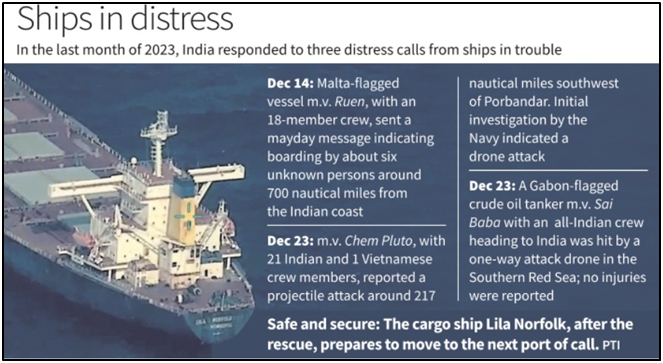Why in news?
- Indian warship INS Chennai and its marine commandos thwarted the attempted hijack of a Liberia-flagged merchant vessel.
- It safely rescued its 21 crew members, including 15 Indians, in north Arabian Sea.
What’s in today’s article?
- Maritime Piracy
- News Summary
Maritime Piracy
- As per the UN Convention on the Law of the Sea (UNCLOS), maritime piracy is when people on a private boat or ship commit crimes like kidnapping, violence, or robbery for personal gain.
- UNCLOS is an international treaty which was adopted and signed in 1982 in Montego Bay, Jamaica
- It lays down a comprehensive regime of law and order in the world’s oceans and seas establishing rules governing all uses of the oceans and their resources.
- This happens on the open sea and is targeted at another vessel or its people and property.
Threats posed by maritime piracy
- Physical Harm, Kidnapping and Associated Humanitarian Concerns:
- Pirates can physically harm crew members and passengers, and they often kidnap individuals for ransom.
- Crew members and passengers may experience trauma and psychological distress as a result of piracy incidents
- Disruption of Trade
- Piracy can disrupt maritime trade routes, causing delays in the delivery of goods and impacting global trade.
- Economic Losses
- Businesses may suffer financial losses due to stolen cargo, ransom payments, increased insurance premiums, and the cost of implementing anti-piracy measures.
- Impact on Fishing Industry
- Pirates sometimes target fishing vessels, affecting the livelihoods of fishermen and the availability of seafood.
- Environmental Risks
- Pirates may engage in illegal activities, such as oil theft or dumping pollutants, posing environmental threats to marine ecosystems.
- Security Concerns
- The presence of piracy raises security concerns for coastal regions and international waters, requiring increased naval and maritime security efforts.
- Global Security
- Piracy can be linked to broader security issues, such as terrorism and organized crime, creating challenges for international security.
Steps taken by India
- Operational steps
- Indian govt has deployed naval ships with armed helicopters to patrol the piracy prone areas.
- The Indian Navy commenced anti-piracy patrols in the Gulf of Aden from October 2008.
- In recent years, task Groups comprising destroyers and frigates have been deployed to undertake maritime security operations and render assistance to merchant vessels in case of any incident.
- Also, aerial surveillance by long-range maritime patrol aircraft and Unmanned Aerial Vehicles has been enhanced to have a complete maritime domain awareness.
- India participates in the various multilateral fora set up to combat piracy
- The Regional Cooperation Agreement on Combating Piracy and Armed Robbery against Ships in Asia (ReCAAP) is a government-to-government agreement that aims to enhance multilateral cooperation among 16 regional countries.
- The Regional Maritime Security Initiative (RMSI) is a partnership between regional nations with varying capabilities and capacities.
- Institutions created by India
- The Navy’s Information Management and Analysis Centre (IMAC) and Information Fusion Centre for Indian Ocean Region (IFC-IOR) are institutions involved in maintaining maritime security.
- Besides, Indian Navy also coordinates with Coast Guard to maintain enhanced surveillance within the Exclusive Economic Zone (EEZ).
- Legislative steps
- India enacted the Maritime Anti-Piracy Act, 2022 to give effect to arrest and prosecute pirates and strengthen the fight against piracy.
- Also, the government’s SAGAR (Security and Growth For All in the Region) Doctrine provides a framework for maritime co-operation in the Indian Ocean region.
News Summary
- Indian Navy secured and safely evacuated all 21 crew members, including 15 Indians, from the merchant vessel Lila Norfolk after it came under a hijacking attempt.
Key highlights
- The ship, Lila Norfolk, sent a message via the UK Maritime Trade Operations portal when it was about 460 nautical miles off the coast of Eyl, Somalia.
- The message reported a possible boarding by five to six unknown armed individuals.
- In response, the Indian Navy diverted the INS Chennai, a destroyer on anti-piracy patrol nearby.
- Additionally, a Maritime Patrol Aircraft (MPA) flew over the ship in the morning and made contact, ensuring the safety of the crew.
Recent hijacking incident in the region
- There have also been a series of attacks on merchant ships by Houthi rebels in Yemen in the Red Sea as well as the Arabian Sea.





